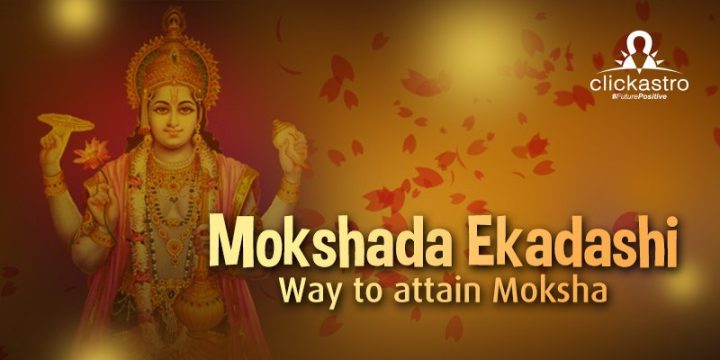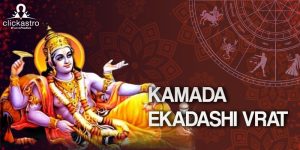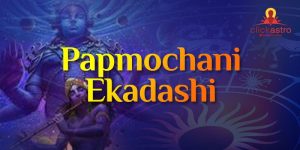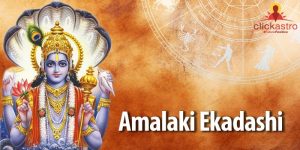Contents[hide]
Attaining Moksha or Liberation on Mokshada Ekadashi
If you are a Hindu, then attaining Moksha is one of the key goals in your life. Hindus consider Ekadashi a holy day and celebrate 24 Ekadashis in a calendar year. During a leap year, there are two extra Ekadashis. Each Ekadashi has ostensible benefits attained by performing specific rituals. One such Ekadashi is the Mokshada Ekadashi, revered as a crucial Ekadashi. Mokshada Ekadashi is celebrated on Ekadashi Tithi (11th Lunar day) of Shukla Paksha (waxing phase) in the lunar month of Margashirsha. In the Gregorian calendar, Mokshada Ekadashi falls in either November or December. Dedicated to complete worship of Lord Vishnu, Mokshada Ekadashi is considered extremely auspicious as observing this Ekadashi helps you get absolved of your sins, ensuring you achieve moksha or liberation after death. This Ekadashi is also celebrated on the same day as Gita Jayanti when Lord Krishna imparted the holy sermon of the Bhagavad Gita to Arjuna. It is also believed that gifting Bhagavad Gita on Mokshada Ekadashi is auspicious as Lord Krishna showers his blessings on both the receiver and the giver. In many parts of India, Mauna Ekadashi and Baikunta Ekadashi are considered the same as Mokshada Ekadashi.Mokshada Ekadashi in 2024 with Muhurat timings
This year, Mokshada Ekadashi will be observed on 11th December 2024. The Muhurat timings are as follows:
- Sunrise: December 11, 2024 7:02 AM
- Ekadashi Tithi Begins: December 11, 2024 3:43 AM
- Ekadashi Tithi Ends: December 12, 2024 1:09 AM
- Sunset: December 11, 2024 5:38 PM
- Hari Vasara End Moment: December 12, 2024 6:29 AM
- Parana Time: December 12, 7:03 AM – December 12, 9:10 AM
- Dwadashi End Moment: December 12, 2024 10:26 PM
What Should You Do During the Fast?
Each year consists of 24 Ekadashis, including Mokshada Ekadashi. Ardent devotees observe fasting on all Ekadashis, and Mokshada Ekadashi fasting is considered most auspicious among all Ekadashis. Therefore, full fasting on Ekadashi is recommended for everyone. However, those who cannot bear such an austerity can follow Ekadashi Vrat by eating once, either at midday or in the evening. You should also know which food items are permitted and which are deemed forbidden during the fast for attaining Moksha.Foods/Spices You Can Consume
You can consume everything from fresh and dry fruits, vegetables, nuts and nut oils to milk, coconut, cassava, potato, sweet potato, buckwheat, olive, sugar, rock salt, pepper, ginger, etc.Foods/Spices You Should Avoid
You should not consume non-veg food (meat, fish, egg, etc.), mushroom, beverages (tea, coffee, cola, and other energy drinks), all types of grains, onion, peas, beans, tulsi, tamarind, custard, sesame seeds, mustard, salt, baking soda, baking powder, asafoetida, cloves, fenugreek, cardamom, nutmeg, fennel, intoxicants (tobacco and liquor), etc. on Mokshada Ekadashi. Get your 2025 horoscope now!How Should You Fast on Mokshada Ekadashi?
Devotees observing the Ekadashi Vrat should wake up before sunrise as the vrat starts at dawn. They then worship Lord Vishnu. Ekadashi vrat is a complete fast that starts from Dashami and ends on Dwadashi. Therefore, devotees observing the fast can observe the fast beginning Dashami sunset and should consume food only once on the day. This will ensure that undigested food is not left in the stomach during Ekadashi vrat. To intensify the spiritual drive, the devotee is advised to visit a Vishnu temple and recite Sri Vishnu Sahasranama. To end the Mokshada Ekadashi Vrat, one must wake up early before sunrise on Dwadashi. After the bath, one must worship Lord Vishnu and break the fast during Parana. Parana (breaking the fast) should not be done during Hari Vasara – the first quarter of Dwadashi. You should wait for Hari Vasara to get over to break the fast. Then, try to break your fast during Pratahkal, the most preferred time. If, due to some reason, you are unable to break the fast during Pratahkal, then you should do it after Madhyahna.Rituals to Follow During Mokshada Ekadashi Pooja
The Mokshada Ekadashi Pooja Vidhi is as follows: Mokshada Ekadashi Vrat and Pooja are important. Devotees observing the Mokshada Ekadashi fast should avoid food on the previous night. This is to ensure that no undigested food is left in the stomach. On Ekadashi day, devotees wake up early in the morning, take a holy bath before sunrise, and vow to observe a complete fast until the next day Dwadashi. Lord Vishnu or Sri Krishna is then worshipped by performing Pooja. The Pooja area is then cleaned and decorated with flowers. Next, lamps are lit, and offerings of incense sticks, flowers, Tulsi leaves, turmeric, sandalwood paste, kumkum, coconut with its husk, bananas, betel leaf, etc., are made. Meditating and chanting the mantra ‘Om Namo Bhagavathe Vasudevaya’ is considered to be auspicious. Reading Mukundashtakam, Vishnu Sahasranamam, or Bhagavad Gita and singing devotional songs and observing Jagran during the entire night in the worship of Lord Vishnu are also recommended. Some devotees also worship Maharishi Ved Vyasa and Shrimad Bhagawad Gita on this day. An offering of ‘Naivedhya’ can also be performed. The Pooja is then concluded by reading the Bhagawad Gita sermons and singing the aarti. Devotees may also visit the temples of Lord Vishnu or Lord Krishna in the evening. On Dwadashi day, after waking up before sunrise and completing all daily rituals and performing the Pooja, donate alms and food to the needy, after which the fast should be broken. Mokshada Ekadashi is more important to the Vaishnava clan of Hindus who consider Lord Vishnu the supreme power. Lord Vishnu is believed to be the one who sustains life on Earth, and worshipping him would provide eternal peace and happiness. The term ‘Mokshada’ means to destroy temptation. Devotees who observe this day believe that it helps them attain moksha (salvation) and liberate them from the cycle of birth and death. It is also believed that observing Mokshada Ekadashi would relieve the devotees’ deceased ancestors from their bane.The Tale of Vaikhanasa
In Hindu mythology, every important day has a take behind it. Brahmanda Purana describes that Lord Krishna explained the significance of Mokshada Ekadashi to the Pandava King Yudhishtira. Legend has it that the city of Champakanagar was ruled by a noble king named Vaikhanasa, who was a compassionate ruler. He had a council of learned Brahmins who guided him in every aspect. One night, the king dreamt that his late father was being punished in hell (naraka), which Lord Yama ruled. He saw that his father was calling out for the king’s help in releasing him from hell. The king was anguished by what he saw, and he narrated the dream to his council and sought their advice. The council advised him to seek the opinion of the omniscient sage, Parvatha Muni. The king approached Parvatha Muni, narrated the dream to him, and expressed his desire to free his father from hell. He wanted to know the reason why his father was suffering in hell. The sage, through meditation, understood the reason behind the king’s father’s ordeal. The sage informed the king that his father had sinned his previous birth. He quarrelled with his wife and forced her to have sexual relations with him while undergoing her menstrual cycle. She tried to protest and resist his advances and even requested that he not interrupt her monthly period; however, he did not stop or leave her alone. Due to this, the king’s father is now undergoing punishment for his sins. To absolve his father’s sins and release him from hell, the sage advised the king to observe the fast on Mokshada Ekadashi day during the Margashirsha month. The king then observed a complete fast on Mokshada Ekadashi day and his family. As a result, the king’s father was liberated from hell and went to heaven by virtue of his fast. Lord Krishna then went on to tell Yudhishtira that whoever faithfully observed the Mokshada Ekadashi fast, which is like Chintamani (the gem that yields all desires), attains special merits that cannot be quantified. Observing the Mokshada Ekadashi fast elevates the devotee from hell to the heavenly and attains spiritual benefits. This is why you should observe this fast and attain Lord Vishnu’s blessings. Just fill your birth details and get your detailed horoscopeImportant Facts – Gita Jayanti / Mauna Ekadashi / Baikunta Ekadashi
Many people also celebrate Gita Jayanti on the day of Mokshada Ekadashi. It is believed that Lord Krishna gave the holy sermon of Bhagavad Gita to Arjuna on this day. Arjuna refused to go into battle with the Kauravas as he did not want to fight his family. Lord Krishna passed him the words of wisdom in the 700-verse Bhagavad Gita. The Bhagavad Gita narrated at the beginning of the Kurukshetra war between the Pandavas and the Kauravas throws light on various Hindu philosophical ideas. On Gita Jayanti/Mokshada Ekadashi, some devotees observe a 24-hour fast in honour of Lord Krishna, the 9th avatar of Vishnu. Mokshada Ekadashi is also referred to as ‘Mauna Ekadashi’, where the devotees observe ‘Mauna’ (silence) all day long. In Orissa and South India, this Ekadashi is also known as ‘Baikunta Ekadashi’.Why You Should Fast on Mokshada Ekadashi
There are many benefits to observing the Mokshada Ekadashi Vrat – Ayurveda cites that excessive intake of food is the cause of lethargy and illnesses. By observing the Vrat (fast, we can cleanse the stomach and rejuvenate the digestive system. Fasting on Ekadashi days can benefit our digestive system as the atmospheric pressure will be low on these days. It also aids in cleansing the digestive system, which is usually worn out due to improper eating habits. The health benefits of bi-monthly Ekadashi fasts include reducing cholesterol, eliminating toxins, rejuvenating the functioning of the liver & kidneys, and purifying the blood.Importance of Mokshada Ekadashi Vrat
Each Ekadashi in the Hindu calendar has its own significance in Hindu traditions and are popular with various names. Of these, the Mokshada Ekadashi falling on the Shukla Paksha of lunar month Margashirsha is considered to be most auspicious for the following reasons. Mokshada Ekadashi Vrat is believed to provide the combined merits of all other Ekadashi fasts. Devotees observing Mokshada Ekadashi Vrat believe that it helps them to get rid of their past sins and attain moksha (salvation). According to Hindu mythology, Mokshada Ekadashi helps the observers to obtain liberation from Pitru Dosha. It can grant moksha or liberation to the observers’ ‘Pitrus’ (dead ancestors). Graha Doshas and Remedies: All You Need to Know Mokshada Ekadashi is also considered important because it is believed to be the day on which Lord Krishna gave the holy sermon of Bhagavad Gita to Arjuna. All Ekadashi Vrat provides the opportunity to progress in the path of spiritual evolution. Therefore, observing the Ekadashi vrat is not just about avoiding food but also about denying all the temptations of body and mind, thus purifying oneself internally and externally.Mokshada Ekadashi Dates from 2024 to 2026
- 2024 Wednesday, December 11, 2024
- 2025 Monday, December 1, 2025
- 2026 Sunday, December 20, 2026







